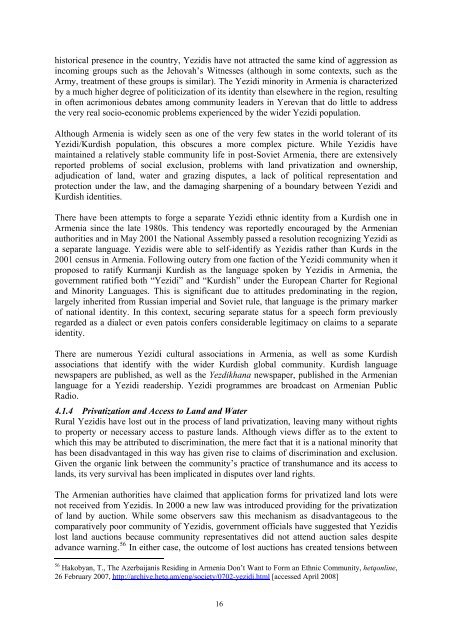The Human Rights situation of the Yezidi minority - UNHCR
The Human Rights situation of the Yezidi minority - UNHCR
The Human Rights situation of the Yezidi minority - UNHCR
You also want an ePaper? Increase the reach of your titles
YUMPU automatically turns print PDFs into web optimized ePapers that Google loves.
historical presence in <strong>the</strong> country, <strong>Yezidi</strong>s have not attracted <strong>the</strong> same kind <strong>of</strong> aggression as<br />
incoming groups such as <strong>the</strong> Jehovah’s Witnesses (although in some contexts, such as <strong>the</strong><br />
Army, treatment <strong>of</strong> <strong>the</strong>se groups is similar). <strong>The</strong> <strong>Yezidi</strong> <strong>minority</strong> in Armenia is characterized<br />
by a much higher degree <strong>of</strong> politicization <strong>of</strong> its identity than elsewhere in <strong>the</strong> region, resulting<br />
in <strong>of</strong>ten acrimonious debates among community leaders in Yerevan that do little to address<br />
<strong>the</strong> very real socio-economic problems experienced by <strong>the</strong> wider <strong>Yezidi</strong> population.<br />
Although Armenia is widely seen as one <strong>of</strong> <strong>the</strong> very few states in <strong>the</strong> world tolerant <strong>of</strong> its<br />
<strong>Yezidi</strong>/Kurdish population, this obscures a more complex picture. While <strong>Yezidi</strong>s have<br />
maintained a relatively stable community life in post-Soviet Armenia, <strong>the</strong>re are extensively<br />
reported problems <strong>of</strong> social exclusion, problems with land privatization and ownership,<br />
adjudication <strong>of</strong> land, water and grazing disputes, a lack <strong>of</strong> political representation and<br />
protection under <strong>the</strong> law, and <strong>the</strong> damaging sharpening <strong>of</strong> a boundary between <strong>Yezidi</strong> and<br />
Kurdish identities.<br />
<strong>The</strong>re have been attempts to forge a separate <strong>Yezidi</strong> ethnic identity from a Kurdish one in<br />
Armenia since <strong>the</strong> late 1980s. This tendency was reportedly encouraged by <strong>the</strong> Armenian<br />
authorities and in May 2001 <strong>the</strong> National Assembly passed a resolution recognizing <strong>Yezidi</strong> as<br />
a separate language. <strong>Yezidi</strong>s were able to self-identify as <strong>Yezidi</strong>s ra<strong>the</strong>r than Kurds in <strong>the</strong><br />
2001 census in Armenia. Following outcry from one faction <strong>of</strong> <strong>the</strong> <strong>Yezidi</strong> community when it<br />
proposed to ratify Kurmanji Kurdish as <strong>the</strong> language spoken by <strong>Yezidi</strong>s in Armenia, <strong>the</strong><br />
government ratified both “<strong>Yezidi</strong>” and “Kurdish” under <strong>the</strong> European Charter for Regional<br />
and Minority Languages. This is significant due to attitudes predominating in <strong>the</strong> region,<br />
largely inherited from Russian imperial and Soviet rule, that language is <strong>the</strong> primary marker<br />
<strong>of</strong> national identity. In this context, securing separate status for a speech form previously<br />
regarded as a dialect or even patois confers considerable legitimacy on claims to a separate<br />
identity.<br />
<strong>The</strong>re are numerous <strong>Yezidi</strong> cultural associations in Armenia, as well as some Kurdish<br />
associations that identify with <strong>the</strong> wider Kurdish global community. Kurdish language<br />
newspapers are published, as well as <strong>the</strong> Yezdikhana newspaper, published in <strong>the</strong> Armenian<br />
language for a <strong>Yezidi</strong> readership. <strong>Yezidi</strong> programmes are broadcast on Armenian Public<br />
Radio.<br />
4.1.4 Privatization and Access to Land and Water<br />
Rural <strong>Yezidi</strong>s have lost out in <strong>the</strong> process <strong>of</strong> land privatization, leaving many without rights<br />
to property or necessary access to pasture lands. Although views differ as to <strong>the</strong> extent to<br />
which this may be attributed to discrimination, <strong>the</strong> mere fact that it is a national <strong>minority</strong> that<br />
has been disadvantaged in this way has given rise to claims <strong>of</strong> discrimination and exclusion.<br />
Given <strong>the</strong> organic link between <strong>the</strong> community’s practice <strong>of</strong> transhumance and its access to<br />
lands, its very survival has been implicated in disputes over land rights.<br />
<strong>The</strong> Armenian authorities have claimed that application forms for privatized land lots were<br />
not received from <strong>Yezidi</strong>s. In 2000 a new law was introduced providing for <strong>the</strong> privatization<br />
<strong>of</strong> land by auction. While some observers saw this mechanism as disadvantageous to <strong>the</strong><br />
comparatively poor community <strong>of</strong> <strong>Yezidi</strong>s, government <strong>of</strong>ficials have suggested that <strong>Yezidi</strong>s<br />
lost land auctions because community representatives did not attend auction sales despite<br />
advance warning. 56 In ei<strong>the</strong>r case, <strong>the</strong> outcome <strong>of</strong> lost auctions has created tensions between<br />
56 Hakobyan, T., <strong>The</strong> Azerbaijanis Residing in Armenia Don’t Want to Form an Ethnic Community, hetqonline,<br />
26 February 2007, http://archive.hetq.am/eng/society/0702-yezidi.html [accessed April 2008]<br />
16
















